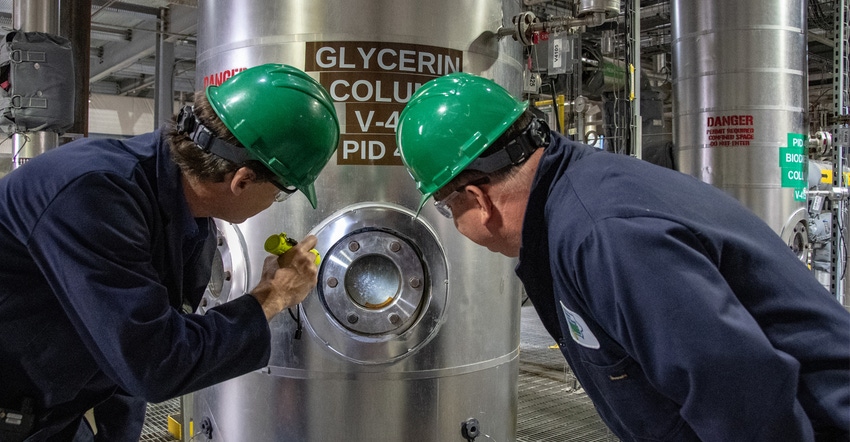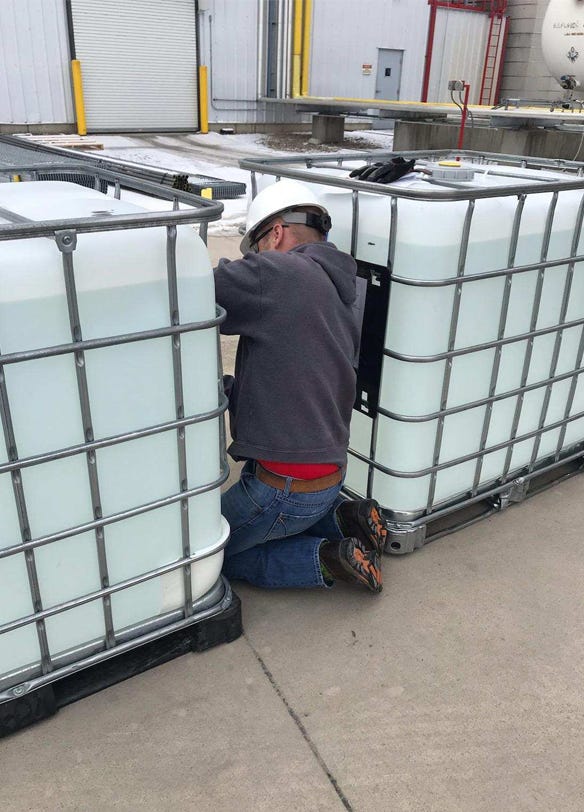April 2, 2020

On March 23, two Iowa Renewable Fuels Association members sent the first donated shipment of Iowa ethanol and glycerin to the state of Iowa to be used by Iowa Prison Industries for production of hand sanitizer during the national shortage. Hand sanitizer is considered effective against the coronavirus. Ethanol and glycerin are ingredients in hand sanitizer products.
This ongoing donation is being made by Iowa ethanol producer Absolute Energy and Iowa biodiesel producer Western Iowa Energy. IRFA worked with Iowa Prison Industries to secure the shipment of these products and other necessary ingredients. Templeton Rye, an Iowa whiskey distiller, is providing distilled water for the project.
The state is distributing the hand sanitizer as a finished product free to hospitals, prisons, nursing homes and other high-priority facilities threatened by the coronavirus. Western Iowa Energy located at Wall Lake in western Iowa is providing the alcohol to make the hand sanitizer, and Absolute Energy at St. Ansgar in northeast Iowa is providing the glycerin.
Donating ethanol, glycerin
“The whole country is working tirelessly to slow the spread of the novel coronavirus, and Iowa biofuel producers are proud to help anyway we can,” says Monte Shaw, IRFA executive director. “We applaud Absolute Energy and Western Iowa Energy for stepping up in the best way they could to help with this effort, as well as the other biofuel plants who stand ready to help if additional production is needed.”

ETHANOL: An employee of the Absolute Energy ethanol plant prepares totes of ethanol for shipment to be used in hand sanitizer production.

IRFA notified Gov. Kim Reynolds’ office in mid-March that Iowa biofuel producers would be willing to help with hand sanitizer production if needed, and her team worked hard to help ensure the project’s success. “Gov. Reynolds and her team deserve credit for making this happen,” Shaw says. “Even during this time of emergency, a number of regulatory technicalities crossing multiple federal agencies stood in our way.”
Shaw adds, “Thanks to the efforts of staff members in Gov. Reynolds’ and Sens. Chuck Grassley and Joni Ernst’s offices, we were able to overcome these hurdles that could have otherwise prevented this production of much-needed hand sanitizer. Knocking down these barriers will have impacts beyond Iowa. In fact, we already know other states have heard about Iowa’s project and are working with their biofuel producers to implement similar programs.”
Market potential
Ethanol and alcohol are the same ingredients, Shaw explains. Ethanol’s industrial uses include both fueling vehicles and as the main ingredient used in hand sanitizers. Several other ethanol producers in the U.S. have also started creating alcohol for hand sanitizers. However, most fuel-grade ethanol production facilities aren’t really designed for producing a pharmaceutical-grade alcohol.
The volume of ethanol they would produce for the sanitizer is small compared to what they produce for fuel. And the quality specifications are much tighter for ethanol to be used as an ingredient in hand sanitizer. Thus, most fuel ethanol production facilities will not be able to make that conversion, says Geoff Cooper, head of the national Renewable Fuels Association.
For those reasons, more distilleries that make whiskey and vodka are beginning to also make a hand-sanitizer product. Smaller distillers, especially those with beverage-grade capabilities, can more easily swing some production over to hand sanitizers.
You May Also Like




